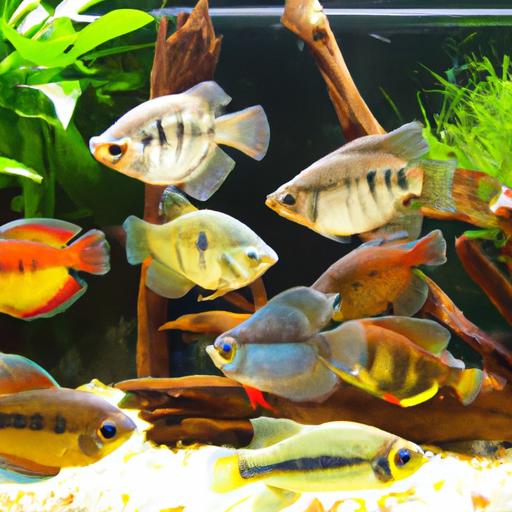
Best Practices for Caring for Betta Fish
Discover the essential Best Practices for Caring for Betta Fish. Learn how to provide optimal tank setup, nutrition, maintenance, and enrichment for your beloved fish.
Introduction
Are you considering bringing a Betta fish into your home? These vibrant and beautiful fish are known for their striking colors and elegant fins. However, caring for Betta fish requires more than just a tank and some food. In order to ensure their well-being, it’s important to follow the best practices for their care. In this article, we will provide you with a comprehensive guide on how to properly care for Betta fish, covering everything from tank setup to feeding and maintenance. Let’s dive in!

Best Practices for Caring for Betta Fish
When it comes to caring for Betta fish, there are several key areas to focus on. By following these best practices, you can provide your Betta with a healthy and happy environment.
A. Tank Setup
The first step in providing proper care for your Betta fish is setting up the right tank environment. Here are some important considerations:
- Ideal tank size and type: Betta fish require a minimum tank size of 5 gallons. A larger tank provides more swimming space and helps maintain stable water conditions.
- Proper filtration and water quality: Invest in a good quality filter to keep the water clean and free from toxins. Regular water testing and maintenance are essential to ensure optimal water quality.
- Temperature and lighting requirements: Maintain a consistent water temperature between 78-80°F (25-27°C) using a heater. Provide appropriate lighting for 8-12 hours a day to mimic their natural habitat.
B. Feeding and Nutrition
Proper nutrition is crucial for the health of your Betta fish. Follow these guidelines for feeding:
- Appropriate diet and feeding schedule: Feed your Betta fish a varied diet of high-quality pellets, supplemented with occasional treats like frozen or live foods. Feed them small portions twice a day, only as much as they can consume in a few minutes.
- Types of food suitable for Betta fish: Look for specially formulated Betta fish pellets that provide a balanced diet. Avoid overfeeding, as it can lead to obesity and other health issues.
- Avoiding overfeeding and potential health issues: Betta fish have small stomachs, so it’s important not to overfeed them. Uneaten food can quickly pollute the water and cause health problems.
C. Maintenance and Cleaning
Regular maintenance and cleaning of the Betta fish tank are essential for their well-being. Here’s what you need to know:
- Regular water changes and tank cleaning: Perform partial water changes every week, around 25-30% of the tank volume. Use a gravel vacuum to remove debris from the substrate. Clean the tank and decorations using a non-toxic aquarium cleaner.
- Importance of maintaining proper pH levels: Betta fish prefer slightly acidic water with a pH range between 6.5 and 7.5. Regularly test the water pH and make necessary adjustments to maintain a stable environment.
- Monitoring and addressing common diseases and infections: Keep a close eye on your Betta fish for any signs of illness, such as loss of appetite, lethargy, or abnormal behavior. If you notice any symptoms, promptly address them by consulting a veterinarian or using appropriate medications.
D. Enrichment and Environment
Creating an enriched environment for your Betta fish is vital to their overall well-being. Consider the following:
- Suitable tank decorations and hiding places: Provide your Betta with places to hide, such as plants, caves, or driftwood. Live or silk plants are a great addition to the tank, as they mimic their natural habitat and provide hiding spots.
- Providing proper stimulation and mental enrichment: Betta fish are intelligent creatures that benefit from mental stimulation. Consider adding toys or mirrors to the tank to keep them engaged and prevent boredom.
- Avoiding stressors and potential hazards: Keep the tank away from direct sunlight and loud noises. Avoid placing the tank in high-traffic areas to minimize stress for your Betta fish.
FAQ (Frequently Asked Questions)
A. What size tank is recommended for Betta fish?
A tank size of at least 5 gallons is recommended for Betta fish. Larger tanks provide more swimming space and help maintain stable water conditions.
B. How often should I feed my Betta fish?
Feed your Betta fish small portions twice a day, as much as they can consume in a few minutes. Avoid overfeeding, as it can lead to health issues.
C. Can Betta fish live with other fish species?
Betta fish are known for their territorial behavior and may not get along with other fish species. It’s generally best to keep them in a separate tank.
D. How can I tell if my Betta fish is sick?
Watch for signs of illness such as loss of appetite, lethargy, or abnormal behavior. If you notice any symptoms, consult a veterinarian or research appropriate treatments.
E. What can I do to prevent fin rot in Betta fish?
Maintain a clean tank with proper water quality and perform regular water changes. Avoid overcrowding and ensure your Betta has a balanced diet to help prevent fin rot.
Conclusion
Caring for Betta fish requires attention to detail and adherence to best practices. By providing the right tank setup, feeding a balanced diet, performing regular maintenance, and creating an enriched environment, you can ensure the health and happiness of your Betta fish. Remember, a well-cared-for Betta fish is a vibrant and joyful addition to any home. Follow these best practices and enjoy the rewarding experience of caring for these beautiful creatures.































